
Pat Hastings
@ophastings.bsky.social
Sociologist at Colorado State University | Parenting, Inequality, Stratification, Econ Soc, Family Demography, Quantitative Methods, Computational Social Science, whatever seems interesting right now…
https://ophastings.com
https://ophastings.com
Pinned
Pat Hastings
@ophastings.bsky.social
· Nov 11

<em>Journal of Marriage and Family</em> | NCFR Family Science Journal | Wiley Online Library
Objective This research note investigates changes in American parents' financial investments in children during the COVID-19 pandemic, as well as whether and how changes in parents' spending varied ...
doi.org
New paper! "The Fall and Rise of Parental Financial Investments During the COVID-19 Pandemic" in the Journal of Marriage and Family.
We examine parental spending on children during the pandemic (compared to 2015-2019) to understand what changed and why. Highlight thread👇
doi.org/10.1111/jomf...
We examine parental spending on children during the pandemic (compared to 2015-2019) to understand what changed and why. Highlight thread👇
doi.org/10.1111/jomf...
Reposted by Pat Hastings
New working paper on family structure & parental investment in extracurriculars. Economic resources explain much of the spending gap between married & cohabiting families. What remains isn't explained by biological relatedness or relationship duration. Feedback welcome!
doi.org/10.31235/osf...
doi.org/10.31235/osf...

October 23, 2025 at 3:20 PM
New working paper on family structure & parental investment in extracurriculars. Economic resources explain much of the spending gap between married & cohabiting families. What remains isn't explained by biological relatedness or relationship duration. Feedback welcome!
doi.org/10.31235/osf...
doi.org/10.31235/osf...
Reposted by Pat Hastings
Over the moon to announce OVERINVESTED, my new book baby due January 20, 2026, with a starred Publishers Weekly review. “Overinvested: The Emotional Economy of Modern Parenting” press.princeton.edu/books/hardco...
October 25, 2025 at 4:06 PM
Over the moon to announce OVERINVESTED, my new book baby due January 20, 2026, with a starred Publishers Weekly review. “Overinvested: The Emotional Economy of Modern Parenting” press.princeton.edu/books/hardco...
New working paper on family structure & parental investment in extracurriculars. Economic resources explain much of the spending gap between married & cohabiting families. What remains isn't explained by biological relatedness or relationship duration. Feedback welcome!
doi.org/10.31235/osf...
doi.org/10.31235/osf...

October 23, 2025 at 3:20 PM
New working paper on family structure & parental investment in extracurriculars. Economic resources explain much of the spending gap between married & cohabiting families. What remains isn't explained by biological relatedness or relationship duration. Feedback welcome!
doi.org/10.31235/osf...
doi.org/10.31235/osf...
Reposted by Pat Hastings
Reposted by Pat Hastings
Just sayin' 😉
With 4 econ hist prizes in a row they should give it to Steve Ruggles already and get it over with
October 14, 2025 at 3:31 PM
Just sayin' 😉
Reposted by Pat Hastings
This is why I am a little concerned everytime a paper finds that old age outcomes are associated with (concurrently assessed) childhood experiences...
The GSS asked the same people about their childhood income rank three different times. 56% changed their answer, even though what was trying to be measured couldn’t change! We dig into this in a new article at @socialindicators.bsky.social.
doi.org/10.1007/s112...
🧵👇 (1/5)
doi.org/10.1007/s112...
🧵👇 (1/5)
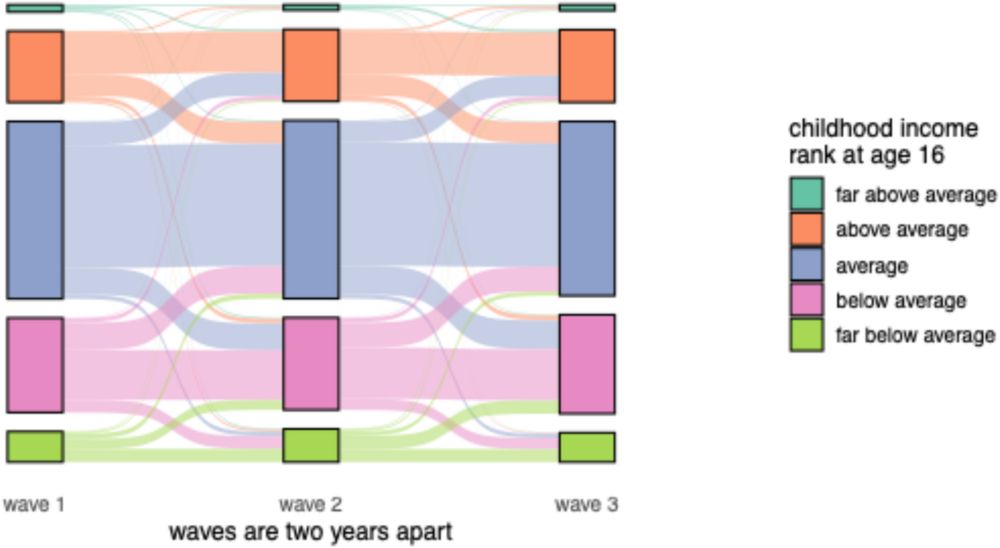
Growing up Different(ly than Last Time We Asked): Social Status and Changing Reports of Childhood Income Rank - Social Indicators Research
How we remember our past can be shaped by the realities of our present. This study examines how changes to present circumstances influence retrospective reports of family income rank at age 16. While retrospective survey data can be used to assess the long-term effects of childhood conditions, present-day circumstances may “anchor” memories, causing shifts in how individuals recall and report past experiences. Using panel data from the 2006–2014 General Social Surveys (8,602 observations from 2,883 individuals in the United States), we analyze how changes in objective and subjective indicators of current social status—income, financial satisfaction, and perceived income relative to others—are associated with changes in reports of childhood income rank, and how this varies by sex and race/ethnicity. Fixed-effects models reveal no significant association between changes in income and in childhood income rank. However, changes in subjective measures of social status show contrasting effects, as increases in current financial satisfaction are associated with decreases in childhood income rank, but increases in current perceived relative income are associated with increases in childhood income rank. We argue these opposing effects follow from theories of anchoring in recall bias. We further find these effects are stronger among males but are consistent across racial/ethnic groups. This demographic heterogeneity suggests that recall bias is not evenly distributed across the population and has important implications for how different groups perceive their own pasts. Our findings further highlight the malleability of retrospective perceptions and their sensitivity to current social conditions, offering methodological insights into survey reliability and recall bias.
doi.org
October 13, 2025 at 3:41 PM
This is why I am a little concerned everytime a paper finds that old age outcomes are associated with (concurrently assessed) childhood experiences...
Reposted by Pat Hastings
Neat paper on status ladders (or ladder-type things), wobbly childhood recall and the underlying sources of wobble bsky.app/profile/opha...
The GSS asked the same people about their childhood income rank three different times. 56% changed their answer, even though what was trying to be measured couldn’t change! We dig into this in a new article at @socialindicators.bsky.social.
doi.org/10.1007/s112...
🧵👇 (1/5)
doi.org/10.1007/s112...
🧵👇 (1/5)

Growing up Different(ly than Last Time We Asked): Social Status and Changing Reports of Childhood Income Rank - Social Indicators Research
How we remember our past can be shaped by the realities of our present. This study examines how changes to present circumstances influence retrospective reports of family income rank at age 16. While retrospective survey data can be used to assess the long-term effects of childhood conditions, present-day circumstances may “anchor” memories, causing shifts in how individuals recall and report past experiences. Using panel data from the 2006–2014 General Social Surveys (8,602 observations from 2,883 individuals in the United States), we analyze how changes in objective and subjective indicators of current social status—income, financial satisfaction, and perceived income relative to others—are associated with changes in reports of childhood income rank, and how this varies by sex and race/ethnicity. Fixed-effects models reveal no significant association between changes in income and in childhood income rank. However, changes in subjective measures of social status show contrasting effects, as increases in current financial satisfaction are associated with decreases in childhood income rank, but increases in current perceived relative income are associated with increases in childhood income rank. We argue these opposing effects follow from theories of anchoring in recall bias. We further find these effects are stronger among males but are consistent across racial/ethnic groups. This demographic heterogeneity suggests that recall bias is not evenly distributed across the population and has important implications for how different groups perceive their own pasts. Our findings further highlight the malleability of retrospective perceptions and their sensitivity to current social conditions, offering methodological insights into survey reliability and recall bias.
doi.org
October 14, 2025 at 7:34 AM
Neat paper on status ladders (or ladder-type things), wobbly childhood recall and the underlying sources of wobble bsky.app/profile/opha...
Reposted by Pat Hastings
“I grew up poor,” as a social identity, subject to change based on current circumstances. Very cool!
The GSS asked the same people about their childhood income rank three different times. 56% changed their answer, even though what was trying to be measured couldn’t change! We dig into this in a new article at @socialindicators.bsky.social.
doi.org/10.1007/s112...
🧵👇 (1/5)
doi.org/10.1007/s112...
🧵👇 (1/5)

Growing up Different(ly than Last Time We Asked): Social Status and Changing Reports of Childhood Income Rank - Social Indicators Research
How we remember our past can be shaped by the realities of our present. This study examines how changes to present circumstances influence retrospective reports of family income rank at age 16. While retrospective survey data can be used to assess the long-term effects of childhood conditions, present-day circumstances may “anchor” memories, causing shifts in how individuals recall and report past experiences. Using panel data from the 2006–2014 General Social Surveys (8,602 observations from 2,883 individuals in the United States), we analyze how changes in objective and subjective indicators of current social status—income, financial satisfaction, and perceived income relative to others—are associated with changes in reports of childhood income rank, and how this varies by sex and race/ethnicity. Fixed-effects models reveal no significant association between changes in income and in childhood income rank. However, changes in subjective measures of social status show contrasting effects, as increases in current financial satisfaction are associated with decreases in childhood income rank, but increases in current perceived relative income are associated with increases in childhood income rank. We argue these opposing effects follow from theories of anchoring in recall bias. We further find these effects are stronger among males but are consistent across racial/ethnic groups. This demographic heterogeneity suggests that recall bias is not evenly distributed across the population and has important implications for how different groups perceive their own pasts. Our findings further highlight the malleability of retrospective perceptions and their sensitivity to current social conditions, offering methodological insights into survey reliability and recall bias.
doi.org
October 14, 2025 at 11:20 AM
“I grew up poor,” as a social identity, subject to change based on current circumstances. Very cool!
Reposted by Pat Hastings
The GSS asked the same people about their childhood income rank three different times. 56% changed their answer, even though what was trying to be measured couldn’t change! We dig into this in a new article at @socialindicators.bsky.social.
doi.org/10.1007/s112...
🧵👇 (1/5)
doi.org/10.1007/s112...
🧵👇 (1/5)

Growing up Different(ly than Last Time We Asked): Social Status and Changing Reports of Childhood Income Rank - Social Indicators Research
How we remember our past can be shaped by the realities of our present. This study examines how changes to present circumstances influence retrospective reports of family income rank at age 16. While retrospective survey data can be used to assess the long-term effects of childhood conditions, present-day circumstances may “anchor” memories, causing shifts in how individuals recall and report past experiences. Using panel data from the 2006–2014 General Social Surveys (8,602 observations from 2,883 individuals in the United States), we analyze how changes in objective and subjective indicators of current social status—income, financial satisfaction, and perceived income relative to others—are associated with changes in reports of childhood income rank, and how this varies by sex and race/ethnicity. Fixed-effects models reveal no significant association between changes in income and in childhood income rank. However, changes in subjective measures of social status show contrasting effects, as increases in current financial satisfaction are associated with decreases in childhood income rank, but increases in current perceived relative income are associated with increases in childhood income rank. We argue these opposing effects follow from theories of anchoring in recall bias. We further find these effects are stronger among males but are consistent across racial/ethnic groups. This demographic heterogeneity suggests that recall bias is not evenly distributed across the population and has important implications for how different groups perceive their own pasts. Our findings further highlight the malleability of retrospective perceptions and their sensitivity to current social conditions, offering methodological insights into survey reliability and recall bias.
doi.org
October 10, 2025 at 2:05 PM
The GSS asked the same people about their childhood income rank three different times. 56% changed their answer, even though what was trying to be measured couldn’t change! We dig into this in a new article at @socialindicators.bsky.social.
doi.org/10.1007/s112...
🧵👇 (1/5)
doi.org/10.1007/s112...
🧵👇 (1/5)
Reposted by Pat Hastings
At the blog, I wrote about two very interesting recent methods articles - Inference to the Best Explanation and External/Construct Validity.
Very thoughtful pushback against the ascendancy of the credibility revolution.
asocial.substack.com/p/inequality...
Hope you enjoy!
Very thoughtful pushback against the ascendancy of the credibility revolution.
asocial.substack.com/p/inequality...
Hope you enjoy!

Inequality Readers. Generally, My Best Guess
IBE, in y.
asocial.substack.com
October 13, 2025 at 10:37 AM
At the blog, I wrote about two very interesting recent methods articles - Inference to the Best Explanation and External/Construct Validity.
Very thoughtful pushback against the ascendancy of the credibility revolution.
asocial.substack.com/p/inequality...
Hope you enjoy!
Very thoughtful pushback against the ascendancy of the credibility revolution.
asocial.substack.com/p/inequality...
Hope you enjoy!
The GSS asked the same people about their childhood income rank three different times. 56% changed their answer, even though what was trying to be measured couldn’t change! We dig into this in a new article at @socialindicators.bsky.social.
doi.org/10.1007/s112...
🧵👇 (1/5)
doi.org/10.1007/s112...
🧵👇 (1/5)

Growing up Different(ly than Last Time We Asked): Social Status and Changing Reports of Childhood Income Rank - Social Indicators Research
How we remember our past can be shaped by the realities of our present. This study examines how changes to present circumstances influence retrospective reports of family income rank at age 16. While retrospective survey data can be used to assess the long-term effects of childhood conditions, present-day circumstances may “anchor” memories, causing shifts in how individuals recall and report past experiences. Using panel data from the 2006–2014 General Social Surveys (8,602 observations from 2,883 individuals in the United States), we analyze how changes in objective and subjective indicators of current social status—income, financial satisfaction, and perceived income relative to others—are associated with changes in reports of childhood income rank, and how this varies by sex and race/ethnicity. Fixed-effects models reveal no significant association between changes in income and in childhood income rank. However, changes in subjective measures of social status show contrasting effects, as increases in current financial satisfaction are associated with decreases in childhood income rank, but increases in current perceived relative income are associated with increases in childhood income rank. We argue these opposing effects follow from theories of anchoring in recall bias. We further find these effects are stronger among males but are consistent across racial/ethnic groups. This demographic heterogeneity suggests that recall bias is not evenly distributed across the population and has important implications for how different groups perceive their own pasts. Our findings further highlight the malleability of retrospective perceptions and their sensitivity to current social conditions, offering methodological insights into survey reliability and recall bias.
doi.org
October 10, 2025 at 2:05 PM
The GSS asked the same people about their childhood income rank three different times. 56% changed their answer, even though what was trying to be measured couldn’t change! We dig into this in a new article at @socialindicators.bsky.social.
doi.org/10.1007/s112...
🧵👇 (1/5)
doi.org/10.1007/s112...
🧵👇 (1/5)
Reviewer 1
Reviewer 2
Reviewer 3
Reviewer 2
Reviewer 3
My reaction to reading papers outside my own area. Three categories:
1. Brilliant
2. Obvious
3. Impenetrable
1. Brilliant
2. Obvious
3. Impenetrable
October 7, 2025 at 4:11 PM
Reviewer 1
Reviewer 2
Reviewer 3
Reviewer 2
Reviewer 3
Reposted by Pat Hastings
Reposted by Pat Hastings
This is a paper I really care about. I feel the core message is very important for social scientists in general, and political scientists in particular.
"Quantitative Research in Political Science is Greatly Underpowered."
(with A+ co-authors)
"Quantitative Research in Political Science is Greatly Underpowered."
(with A+ co-authors)
September 11, 2025 at 2:29 AM
This is a paper I really care about. I feel the core message is very important for social scientists in general, and political scientists in particular.
"Quantitative Research in Political Science is Greatly Underpowered."
(with A+ co-authors)
"Quantitative Research in Political Science is Greatly Underpowered."
(with A+ co-authors)
We're hiring an Assistant Professor in Criminology (in our Sociology department)! Tenure track. 2/2 teaching load. Great colleagues. Fantastic location.
jobs.colostate.edu/postings/165...
jobs.colostate.edu/postings/165...

Assistant Professor of Sociology
Assistant Professor of Sociology with an expertise in Criminology, tenure track, nine-month position beginning August 16, 2026. Competitive salary for an entry-level position. The Department offers un...
jobs.colostate.edu
September 9, 2025 at 5:03 PM
We're hiring an Assistant Professor in Criminology (in our Sociology department)! Tenure track. 2/2 teaching load. Great colleagues. Fantastic location.
jobs.colostate.edu/postings/165...
jobs.colostate.edu/postings/165...
Forthcoming!🍾
Fun new project! The 2006-2014 GSS had rotating 3-wave panels. Only 44% gave the same answer each time about childhood income rank, even though what was being measured couldn't change. We unpack this in a new working paper: osf.io/preprints/so...
Feedback welcome!🤗
@socarxiv.bsky.social #sociology
Feedback welcome!🤗
@socarxiv.bsky.social #sociology
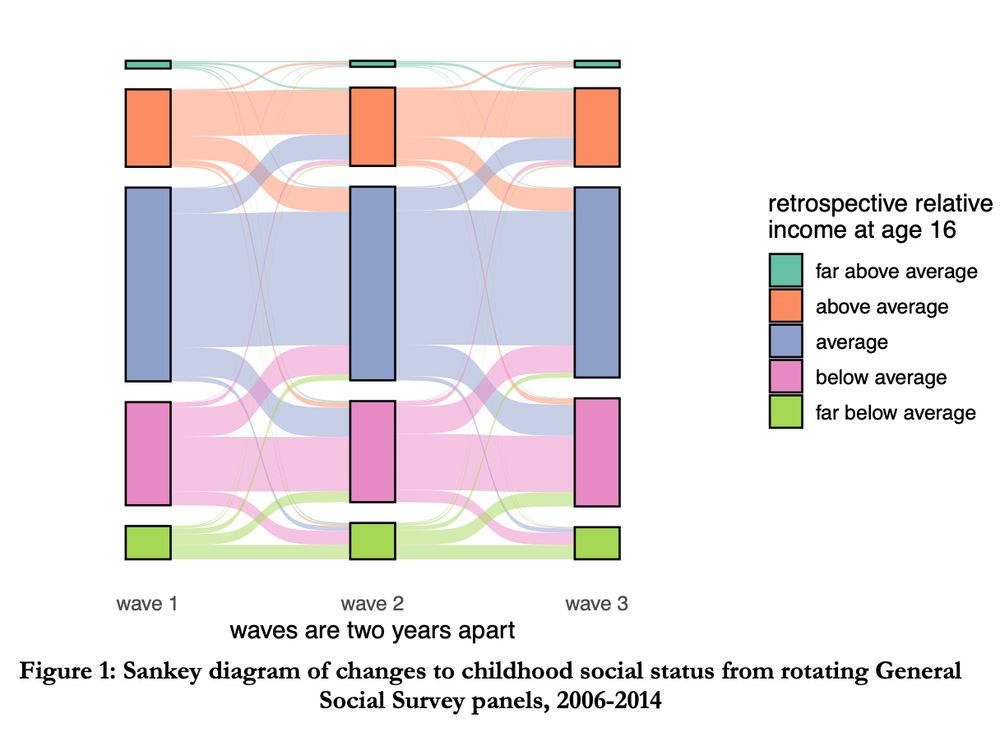
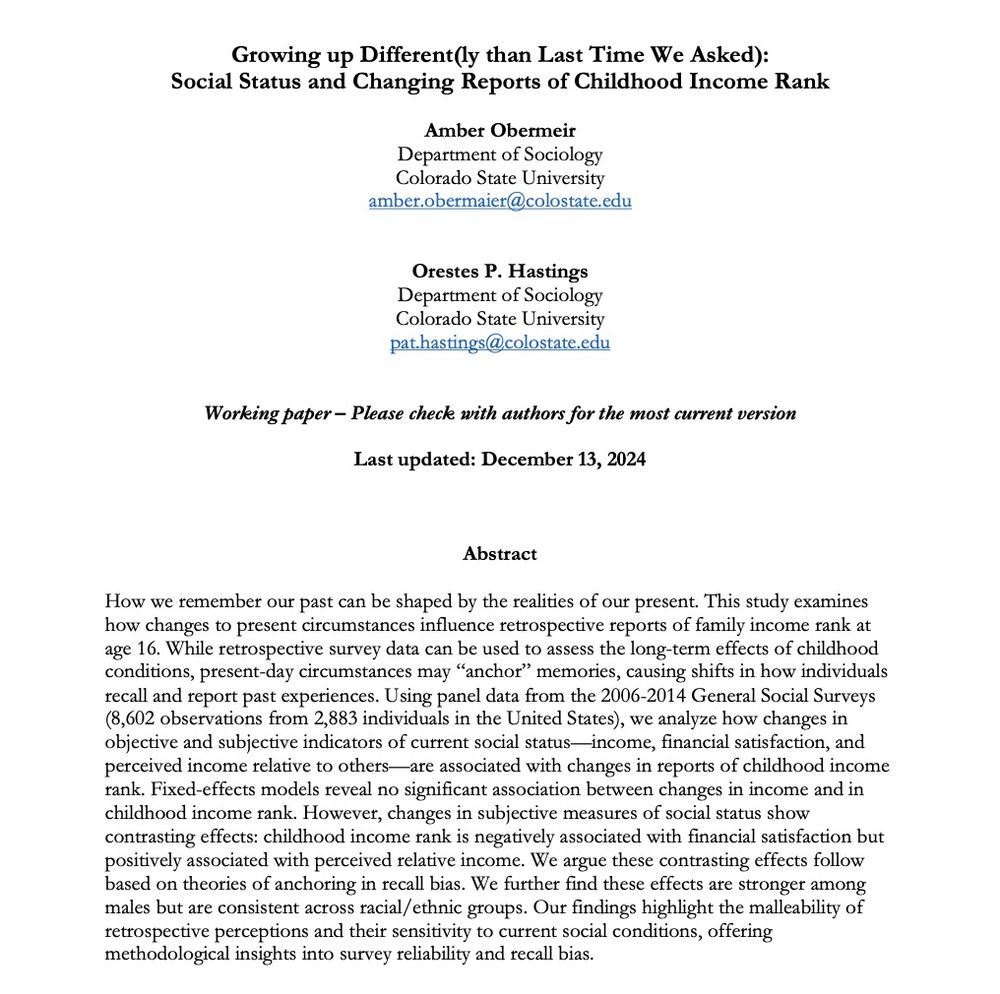
August 12, 2025 at 9:18 PM
Forthcoming!🍾
Reposted by Pat Hastings
Thank you, Herman. It was fun to put it together and I find the contributions impressive. The last few will be coming online shortly and then the full special issue will be out soon. Complete line-up below, quick summaries here: doi.org/10.1177/0049...
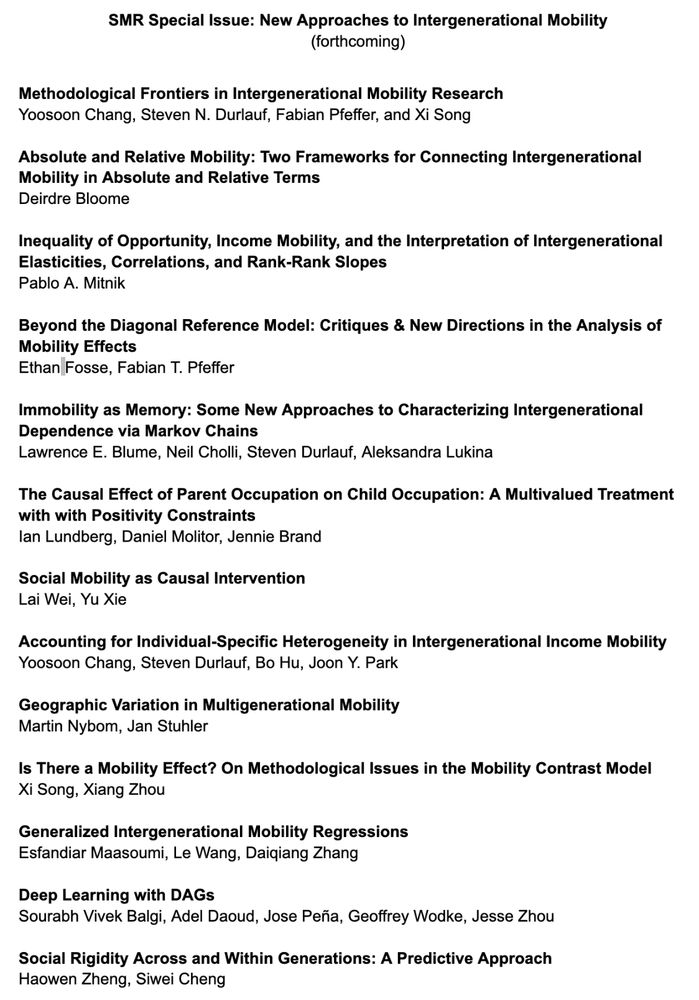
July 3, 2025 at 4:48 AM
Thank you, Herman. It was fun to put it together and I find the contributions impressive. The last few will be coming online shortly and then the full special issue will be out soon. Complete line-up below, quick summaries here: doi.org/10.1177/0049...
Reposted by Pat Hastings
🔥Coming July 2: 'Metrics and Models'!🔥
A new seminar series on advanced modelling w/ impact across health/society.
🌍 Open to *ALL*!
🕑 Weds 2pm UK alternating weeks (online)
🔗 metrics-and-models.github.io
📬 metrics_and_models-subscribe@maillist.ox.ac.uk
Brilliant speakers. *Please share*!
A new seminar series on advanced modelling w/ impact across health/society.
🌍 Open to *ALL*!
🕑 Weds 2pm UK alternating weeks (online)
🔗 metrics-and-models.github.io
📬 metrics_and_models-subscribe@maillist.ox.ac.uk
Brilliant speakers. *Please share*!
June 10, 2025 at 5:48 PM
🔥Coming July 2: 'Metrics and Models'!🔥
A new seminar series on advanced modelling w/ impact across health/society.
🌍 Open to *ALL*!
🕑 Weds 2pm UK alternating weeks (online)
🔗 metrics-and-models.github.io
📬 metrics_and_models-subscribe@maillist.ox.ac.uk
Brilliant speakers. *Please share*!
A new seminar series on advanced modelling w/ impact across health/society.
🌍 Open to *ALL*!
🕑 Weds 2pm UK alternating weeks (online)
🔗 metrics-and-models.github.io
📬 metrics_and_models-subscribe@maillist.ox.ac.uk
Brilliant speakers. *Please share*!
Reposted by Pat Hastings
🧵1/8
In our new #OA article, we studied the drivers of ethnic school segregation.
Research on segregation often points to parental preferences, but what if it's not just about what parents want, but also what options they actually have?
🔗 doi.org/10.1093/esr/jcaf027
In our new #OA article, we studied the drivers of ethnic school segregation.
Research on segregation often points to parental preferences, but what if it's not just about what parents want, but also what options they actually have?
🔗 doi.org/10.1093/esr/jcaf027
June 9, 2025 at 12:12 PM
🧵1/8
In our new #OA article, we studied the drivers of ethnic school segregation.
Research on segregation often points to parental preferences, but what if it's not just about what parents want, but also what options they actually have?
🔗 doi.org/10.1093/esr/jcaf027
In our new #OA article, we studied the drivers of ethnic school segregation.
Research on segregation often points to parental preferences, but what if it's not just about what parents want, but also what options they actually have?
🔗 doi.org/10.1093/esr/jcaf027
Reposted by Pat Hastings
How much of the "long arm of childhood" works thru intergenerational stratification?
Almost all for some health outcomes like psychological distress and self-rated health, but a lot less for others like severe chronic conditions. Heart attacks and stroke are in between.
Almost all for some health outcomes like psychological distress and self-rated health, but a lot less for others like severe chronic conditions. Heart attacks and stroke are in between.
“Mediating Role of Intergenerational Stratification in the Long Arm of Childhood Income”: With @umpsid & mediation techniques, @davebrady72 et al find "adult income is a key mediator in the...r’ship btw childhood income & mature adult health.” @priceschool.usc.edu
read.dukeupress.edu/demography/a...
read.dukeupress.edu/demography/a...

June 3, 2025 at 5:50 PM
How much of the "long arm of childhood" works thru intergenerational stratification?
Almost all for some health outcomes like psychological distress and self-rated health, but a lot less for others like severe chronic conditions. Heart attacks and stroke are in between.
Almost all for some health outcomes like psychological distress and self-rated health, but a lot less for others like severe chronic conditions. Heart attacks and stroke are in between.
Reposted by Pat Hastings
Good news! Release 1 of the 2024 GSS is available for download.
The 2024 GSS, like 2022, uses web, in-person, and phone modes. For some variables this can complicate analyses of trends. See documentation.
Still a prob sample & gold standard survey w/ high resp rates (by contemporary standards).
The 2024 GSS, like 2022, uses web, in-person, and phone modes. For some variables this can complicate analyses of trends. See documentation.
Still a prob sample & gold standard survey w/ high resp rates (by contemporary standards).
Get the Data | NORC at the University of Chicago
gss.norc.org
May 26, 2025 at 10:27 PM
Good news! Release 1 of the 2024 GSS is available for download.
The 2024 GSS, like 2022, uses web, in-person, and phone modes. For some variables this can complicate analyses of trends. See documentation.
Still a prob sample & gold standard survey w/ high resp rates (by contemporary standards).
The 2024 GSS, like 2022, uses web, in-person, and phone modes. For some variables this can complicate analyses of trends. See documentation.
Still a prob sample & gold standard survey w/ high resp rates (by contemporary standards).
Reposted by Pat Hastings
Attn: the special issue of SMR on Generative AI in Sociology is now online. The whole issue is fire, but the introduction by @thomasdavidson.bsky.social and Danny Karell is a must read, covering prompting, measurement, and simulations. It's a road map for soc sci research in the genAI era. +
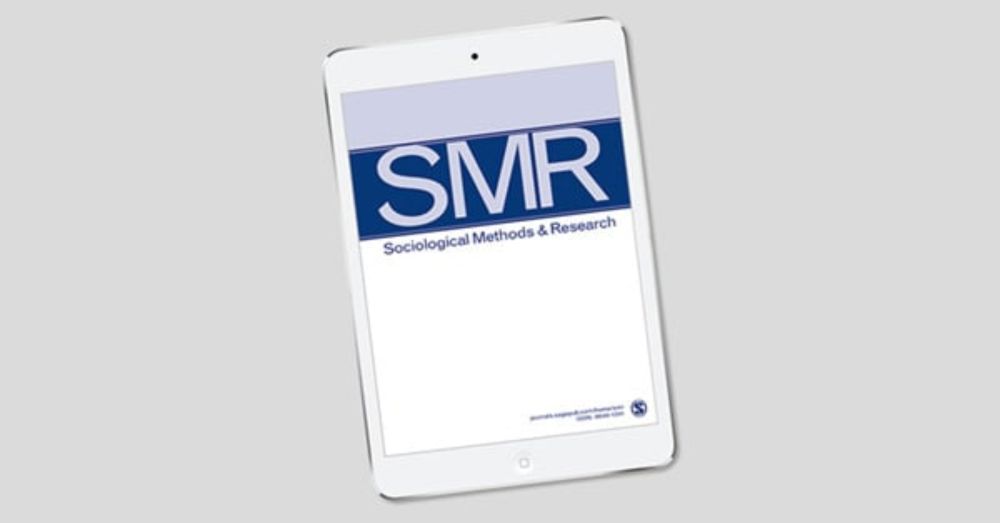
Integrating Generative Artificial Intelligence into Social Science Research: Measurement, Prompting, and Simulation - Thomas Davidson, Daniel Karell, 2025
Generative artificial intelligence (AI) offers new capabilities for analyzing data, creating synthetic media, and simulating realistic social interactions. This...
journals.sagepub.com
May 26, 2025 at 9:49 PM
Attn: the special issue of SMR on Generative AI in Sociology is now online. The whole issue is fire, but the introduction by @thomasdavidson.bsky.social and Danny Karell is a must read, covering prompting, measurement, and simulations. It's a road map for soc sci research in the genAI era. +
Reposted by Pat Hastings
Join us on tomorrow, 22 May, at 14.30 CET for the Analytical Sociology Seminar with @ophastings.bsky.social🔹Why does parenting vary by socioeconomic status? Insights from expenditure surveys and computational text analysis 🔹More info: liu.se/en/event/202...

Analytical Sociology Seminar: Parenting and Socioeconomic Status
Välkommen till Analytisk Sociologi Seminar med Orestes P. Hastings från Colorado State University. Seminariet är öppet för allmänheten och hålls på engelska. Kontakta madelene.topfer@liu.se för Zoom-l...
liu.se
May 21, 2025 at 7:46 PM
Join us on tomorrow, 22 May, at 14.30 CET for the Analytical Sociology Seminar with @ophastings.bsky.social🔹Why does parenting vary by socioeconomic status? Insights from expenditure surveys and computational text analysis 🔹More info: liu.se/en/event/202...
I'm presenting tomorrow (early morning for me in Colorado; afternoon for Sweden). This is a Zoom talk, so anyone is welcome!
Excited to announce the agenda for the IAS Seminar Series this spring 2025! Don’t miss our stellar lineup of speakers—everyone’s welcome to join! 🌟 #AcademicSky #Sociology #CSS
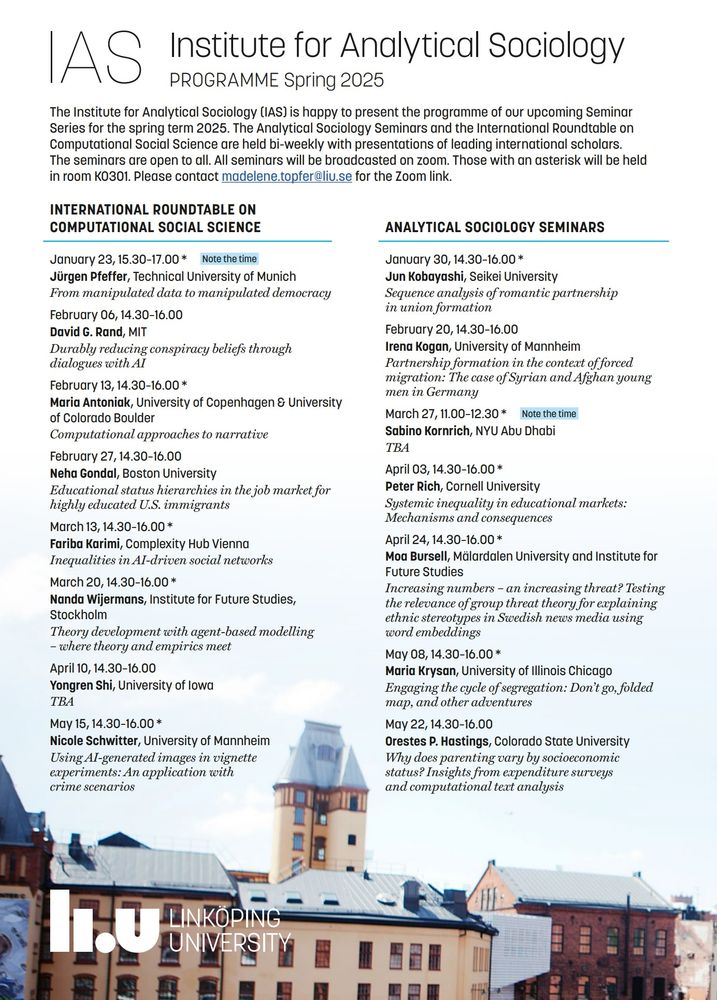
May 21, 2025 at 7:10 PM
I'm presenting tomorrow (early morning for me in Colorado; afternoon for Sweden). This is a Zoom talk, so anyone is welcome!



